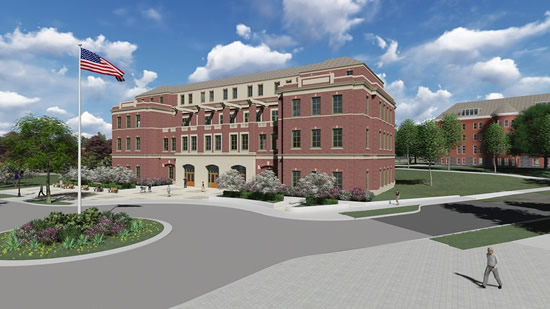University of Portland Breaks Ground on New Academic Building
Groundbreaking on the University of Portland’s new academic building, Dundon-Berchtold Hall, took place in September. Board of Regents member Amy Dundon-Berchtold and Jim Berchtold ’63, were joined in turning the ceremonial first shovel by University President Rev. Mark L. Poorman, C.S.C.; Provost Thomas Greene; University Board of Regents Chair Thomas Arndorfer; and ASUP President Brandon Rivera.

The Dundon-Berchtolds made the $15 million lead gift commitment for construction of the hall on the university's Portland, OR, campus. This gift also funded the Dundon-Berchtold Institute for Moral Formation and Applied Ethics, which will be housed in the new building. Along with providing a home for the Institute, the new academic center will also add over 63,000 square feet of classrooms, offices and the recently announced Brian Doyle Lecture Hall.
In his remarks, Fr. Poorman called the groundbreaking a “hope-filled occasion.” He went on to say, “Dundon-Berchtold Hall is a critical step in the university’s commitment to providing the best possible education for our students. One that’s holistic and intellectually rigorous, and character focused, and grounded in faith.”
While thanking the many donors who have contributed to construction of the Hall, Fr. Poorman extended special gratitude to the Dundon-Berchtolds for moving the university “from a conversation phase to a happening phase.” And he noted that the university was proud to name the building in honor of them and their generous commitment.
Dundon-Berchtold Hall will provide much needed academic space for the campus. As the student population at the university has grown 30 percent over the past decade, classroom space has remained the same. Many of the classrooms in the hall will be designed for interactive learning, with spaces that are equipped with moveable furniture and updated technology. Other “cluster” classrooms will be used for small groups of students to work cooperatively and collaboratively together on projects and assignments, a core requirement of many university courses across all disciplines.
Dundon-Berchtold Hall is set for completion in January 2019.